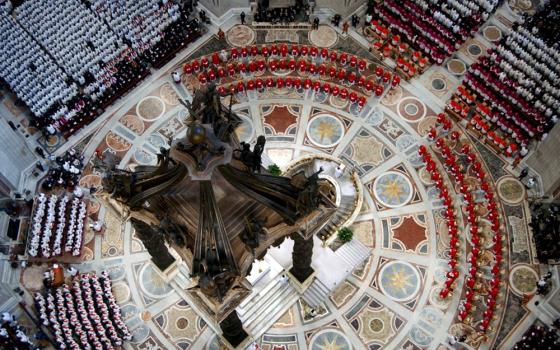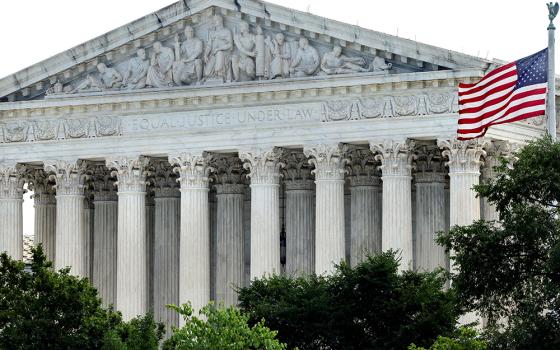The death of Christopher Lane in Duncan, Okla., is one of those events that should serve as a cultural epiphany. Lane, a 22-year-old baseball player from Australia, was killed while walking down the street by three teenagers who said they killed him because they were bored. Here is the culture of death on full display and without the possibility of any euphemism obscuring the evil at work. Here is a modern-day example of Augustine's theory that evil is an absence: Death is not merely the absence of life, but the three teenagers had nothing better to do with their time than to shoot a complete stranger who had done them no harm. The absence of engagement is boredom and this particular absence led to the great absence of life that is death. It is in the fullest sense of the word horrific.
On far too many days, when reading the Metro section of The Washington Post, there will be a three- or four-paragraph account of someone being killed. Far too often, it is a teenager, usually living in one of the poorer neighborhoods in the city and its environs. Usually, the killing is associated with an attempt to steal. Sometimes, it is an act of vengeance. A few times, it is purposeless, but not most times. Of course, for those who have lost a loved one, the reason does not really compensate or explain the loss, but it does explain the violence.
Last week, we have seen scenes of carnage and killing on the streets of Egypt. Those killed are just as precious in the eyes of the Lord as Christopher Lane. Some of the violence, especially the violence directed at Christians, is mistakenly labeled religious violence. It is not. The Christians are attacked and their churches burned, because they opposed the Muslim Brotherhood and support the military that, they rightly believe, will be more cognizant of their rights and security. The violence is not perpetrated against them because they are Christians but because of the political stance taken by most Christians. It is political violence or, in some instances, tribal violence cloaked in religious garb. There is a logic -- a false logic, a sinful logic, but a logic nonetheless -- to the killings in Egypt. There was no such logic in Oklahoma.
The Holy Father in his visit to Lampedusa, the small island that serves as an entry point for tens of thousands refugees, denounced the "globalization of indifference." All violence is rooted in indifference, and all violence can only be overcome, finally, by encounter. The teenagers in Oklahoma did not bother to engage Mr. Lane; they were indifferent to him. The thief who guns down a young man to steal his wallet or his jacket is indifferent not only to the victims' property but to his life. Those in Egypt who slay fellow Egyptians are indifferent to the lives, the families and the aspirations of their victims, counting them for less than their own lives, families and aspirations. The violence that is abortion is an example of indifference, too, as is the legislator or magistrate who seeks ways to justify it, to excuse the indifference by explaining that they can't really do anything about it. Lethal violence is not the only category of violence resulting from indifference: Sexual violence is rooted in an indifference to the dignity of the person violated, and while it may not kill the body, it may oftentimes kill the soul.
The opposite of indifference is, of course, encounter. As Pope Francis tells us time and again, a conscience conformed to Jesus Christ cannot be indifferent to others. Indifference is the absence of grace because a person cognizant of their blessings is a person disposed to harm no one. Augustine is often considered a dark pessimist, but he was simply supremely realistic about our human need for grace to overcome sin. Similarly, and though it makes some of my liberal friends squirm, Pope Francis repeatedly warns us against the snares of the devil. Evil is real. Evil is present, not just out there, not just in the bored hearts of those Oklahoma teenagers or the angry mobs in Cairo: Evil is present in the heart of each of us whenever we fail to fill our hearts with gratitude. Every time we reduce another person to an object of our pleasure, an object of our rage, an object of any variety, we sin and sin gravely. We really must pray for our enemies. That is what sends the devil to flight.
I do not understand the violence in Oklahoma, but I also do not understand the boredom. Among the many blessings in my life, being the child of two parents who were both educators and both faithful Catholics, I learned early on that if there is a book at hand, there is no reason to be bored. But we must do more than look out for our own souls. In this culture of death, we must help each other through the banalities of our culture. We must share ideas with each other, share time with each other, share beauty with each other. This will gird us to go out into the world as the Holy Father asks us and combat the culture of indifference, which is the culture of death, with our own culture of life and grace and beauty.
Would that someone imbued with the Holy Father's sense of compassion and grace had reached those kids in Oklahoma. Would that the people of Egypt, all of them, would recognize the futility of violence in resolving their political differences. Would that the Post's Metro section would never again have a three-paragraph item announcing the death of another young person. We may not be able to change the world, but we can change ourselves. That is what the Holy Father is asking us. That is what the Gospel asks us. To convert, to change ourselves, to become vessels of grace and advocates for a culture of life, and not just advocates but progenitors of a culture of life. It all starts by getting on our knees and confronting the ways we have been indifferent and asking the Lord to give us the grace, to form our consciences, so that we can encounter each person and see in them the handiwork of God.





